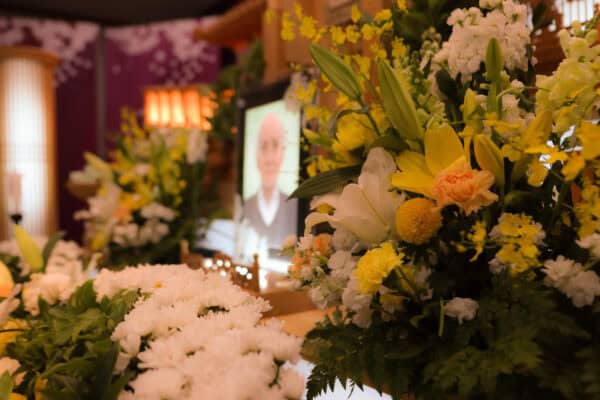When we think of funerals and cremation ceremonies, we often think of a solemn gathering in a religious building or a formal graveside or funeral home setting. But maybe your loved one wasn’t religious or wished for a specific type of ceremony. Or perhaps a family member or other attendees would feel uncomfortable with a religious ceremony.
Whatever the reason, many families opt to hold an alternative funeral known as a non-religious cremation ceremony. So what are your options, and what should you consider when you arrange a non-religious funeral service? Let’s find the answers.
Table of Contents
6 Types of Non-Religious Funerals
One of the greatest advantages of non-religious funerals is the variety of options available to truly pay tribute to your loved one’s life. There are six common types to choose from.
1. Celebration of Life
A celebration of life ceremony focuses on celebrating your loved one’s life instead of mourning their loss. During this non-religious funeral ceremony, you share memories, anecdotes, and music that reflect your loved one’s personality and interests.
You can hold these celebrations at home, in a park, or in a more formal setting depending on your family’s or the deceased’s final wishes. This type of ceremony offers flexibility and focuses on positivity and remembrance so you can honor your loved one in a personal, joyful way.
2. Memorial Service
A memorial service is similar to a funeral service but without the body present. You can hold it shortly after your loved one’s passing or at a later date, allowing for more flexibility for people to travel from far away. The service can include aspects that reflect the values of your loved one’s life, such as:
- Music
- Readings
- Speeches
Memorial services are a great option because it’s a formal way to say goodbye and can offer closure to family and friends while still allowing you to personalize the funeral service in ways that are meaningful to them.
3. Scattering Ceremony
In a scattering ceremony, cremated remains are scattered in a place that was significant to the deceased, such as a favorite nature spot, over water, or in a dedicated scattering garden. This allows you to physically return your loved one to nature, which can be very comforting to those who feel a deep connection to the earth or the place you choose.
4. Green/Eco-Friendly Ceremony
Just as the name sounds, green ceremonies are eco-friendly ceremonies focusing on sustainability and minimal environmental impact. They typically involve biodegradable urns or caskets and natural burial sites without the use of toxic embalming fluids.
These ceremonies are both environmental and emotional and allow you to return your loved one to the earth in a natural, respectful way.
5. Direct Goodbye
A direct goodbye is a very simple, straightforward cremation with no ceremony or attendees other than immediate family. It’s usually held at the graveside or crematorium, making it very affordable and intimate. You and your family can reflect on your loss privately without the stress of organizing a larger event.
6. Virtual Ceremony
Virtual ceremonies have become more common, especially since the pandemic. They’re perfect when people can’t gather because of geographical distance or public health restrictions.
Just as the name indicates, they’re conducted on virtual platforms like Zoom, Google Teams, or live-stream so that people from all over the world can participate.
Why Hold Non-Religious Funerals?
Non-religious cremation ceremonies offer various benefits for you, your family, and your attendees.
You Can Personalize Them
Non-religious ceremonies allow for a more personalized commemoration of your loved one’s life. You can tailor every aspect of the ceremony to reflect your loved one’s unique personality, interests, and values, including:
- Music
- Readings
- Location
- Format
This freedom allows you to truly honor your loved one’s life and legacy in a way that might not be possible in more traditional, religious settings.
They’re More Inclusive
Families tend to have diverse beliefs and backgrounds, so some religious traditions or locations may cause discomfort and even conflict. Non-religious ceremonies can be more inclusive, allowing you to choose a neutral location that’s more accommodating and welcoming to all attendees. This will make the experience much less stressful and promote unity and collective healing.
They Offer More Time and Location Flexibility
Most religious ceremonies have a strict time and schedule since you’re using shared facilities with a set open and close time. Non-religious ceremonies don’t have those restrictions, so they are much more flexible.
You can choose a time and place that has special significance to the deceased or is more convenient for attendees. You can even do virtual ceremonies for those who can’t attend in person, unlike a traditional funeral service.
They Focus on the Deceased
Non-religious ceremonies focus on celebrating the deceased’s individual’s life rather than sticking to religious doctrines such as the afterlife. This can allow mourners to connect more with their memories of the deceased and celebrate their life’s achievements.
They’re More Cost-Effective
According to the National Funeral Directors Association (NFDA), traditional burial funerals cost an average of almost $8,000 because of all the costs involved with more formal religious services, such as church fees and religious officiants.
On the other hand, non-religious ceremonies often cost much less because they avoid those expenses and allow you to make simpler choices. In some cases like scattering ceremonies, you may only need to purchase an urn for a meaningful, dignified funeral service that honors and remembers your loved one.
Considerations When Choosing a Non-Religious Cremation Ceremony
Pre-planning a cremation and a non-religious cremation ceremony can seem daunting, but it can actually be quite simple. When making cremation funeral arrangements, focus on creating a meaningful and personalized non-religious funeral that honors your loved one’s life and values while accommodating the needs of the grieving family. This allows you to hold a ceremony that resonates with family and friends.
Here are several considerations to help guide the planning process.
Personal Preferences
First, reflect on the deceased’s preferences and lifestyle, considering aspects such as their:
- Passions
- Hobbies
- Favorite places
Incorporating these elements can make the ceremony more personal and meaningful.
Venue Selection and Logistics
Next, consider the venue and logistics. Choose a venue that was significant to your loved one or that provides a comforting environment for attendees. This could include:
- A favorite park
- A family home
- A special garden
- A more formal event space
You should also think about practical details like timing, accessibility for attendees, and any audio-visual requirements for displaying videos or photos during the ceremony. If anyone can’t attend in person, consider setting up a livestream or recording the ceremony so they can participate virtually.
Participant Involvement
Decide who you want to speak, share memories, or perform music during the funeral program. It’s often comforting to include contributions from various people who were significant in your loved one’s life, such as:
- Family members
- Close friends
- Co-workers
Ceremony Content
Next, plan the content of the ceremony, including music, readings, or poetry that was significant to the deceased or celebrates their life. Choosing non-religious yet personal, meaningful content can help convey your loved one’s essence.
Memorial activities
Allowing attendees to participate in the ceremony actively can provide a therapeutic outlet for grief. So consider incorporating activities such as writing messages on biodegradable balloons or distributing cremation stones to place in a memorial garden or take home.
Legal and Administrative Aspects
Last but certainly not least, make sure you handle all legal and administrative aspects, including:
- The cremation process
- Handling the ashes
- Permits for scattering ashes (if applicable)
By thoroughly considering these elements, you can arrange a non-religious ceremony that’s heartfelt, dignified, and truly honors your loved one’s life and memory.
Honor Your Loved One With Dignity With Philadelphia Cremation Society
Non-religious funerals offer a unique, economical way to celebrate and honor your loved one after their passing. But planning a dignified ceremony for your loved one can feel overwhelming when you’re still dealing with grief from their passing.
Philadelphia Cremation Society is here to help. We provide affordable, tailored prepaid cremation plans and immediate-need cremation services to make the entire process stress-free. Contact us today to see how we can help you with your alternative funeral in your time of need.
Key Takeaways for Non-Religious Funerals
- Non-religious funerals offer a flexible, thoughtful, economical way to honor a deceased loved one.
- There are six types of non-religious funerals: a celebration of life, memorial service, scattering ceremony, green/eco-friendly ceremony, direct goodbye, and a virtual ceremony.
- Non-religious ceremonies allow for personalization, inclusivity, time and location flexibility, and affordability compared to traditional funerals.
- Factors to consider when planning a non-religious cremation ceremony include your personal preferences, the venue location and logistics, participant involvement, the ceremony’s content, memorial activities, and legal and administrative aspects.






